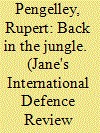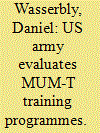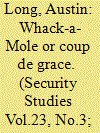| Srl | Item |
| 1 |
ID:
133352


|
|
|
|
|
| Publication |
2014.
|
| Summary/Abstract |
Ground troops have been spoiled for communications choices in Afghanistan and elsewhere, but communication in the jungle remain as much an art as they are a science and need regular practice. Rupert Pengelley investigates.
|
|
|
|
|
|
|
|
|
|
|
|
|
|
|
|
| 2 |
ID:
134208


|
|
|
|
|
| Publication |
2014.
|
| Summary/Abstract |
The end of the Cold War should also have meant the coming of the flourishing of international law, many (myself included) naively believed. However, the "uni-polar moment" that gained momentum in the 1990s, though its life-span turned out to be rather short, saw a gung ho attitude towards foundational principles of international law such as non-use of force and non-interference in internal affairs of states. NATO's 1999 operation over Kosovo, the 2003 invasion of Iraq, the 2008 Georgia-Russia war, policies reflected in the slogan "all the options are on the table", and now Ukraine's tragedy show that international law and morality are used mainly as covers in the geopolitical struggle. If the Cold War manifested the competition between two ideologies-capitalism and communism-today's main historical controversy is between the uni-polar and multi-polar visions of the world. It is not ideological, it is geopolitical, where ideology, morality and law are used as tools and collaterals in the struggle for the configuration of tomorrow's world. It is also a struggle for the nature of international law. Will it become a kind of supra-national law (à la EU law for the whole world) dictated from one centre, or will it develop as a legal system based on the balance of interests and values of different states and cultures? The author believes that the world is simply too big, complex and diverse for the first choice to realize in practice. Its rich tapestry cannot be flattened into a carpet where one pattern, be it of a Judeo-Christian, Anglo-Saxon, Confucian, Muslim or even secular liberal-democratic pattern, prevails. Attempts to force one, "the only true", vision on the whole world not only undermine international law; they are also utopian endeavours fraught with endless conflicts.
|
|
|
|
|
|
|
|
|
|
|
|
|
|
|
|
| 3 |
ID:
131750


|
|
|
|
|
| Publication |
2014.
|
| Summary/Abstract |
The US Army is studying how it trains helicopter pilots and unmanned aircraft system (UAS) operators as the service is working to formulate courses to ensure the two specialties are connected.
|
|
|
|
|
|
|
|
|
|
|
|
|
|
|
|
| 4 |
ID:
134005


|
|
|
|
|
| Publication |
2014.
|
| Summary/Abstract |
Targeting the leadership of terrorist and insurgent groups has become a major component of US strategy since the attacks of September 11, 2001. Despite attracting modest scholarly attention, the conditions that increase or decrease the efficacy of leadership targeting remain unclear. A major limitation of current scholarly work is the lack of exploration of the internal organization of these groups and the relationship of that organization to leadership targeting effects. A close examination of leadership targeting of armed groups in Iraq and Afghanistan reveals that leadership targeting is highly effective against groups that are poorly institutionalized but has limited effects against well-institutionalized groups. This suggests that the level of resources devoted to leadership targeting should be inversely proportional to the level of institutionalization of the target.
|
|
|
|
|
|
|
|
|
|
|
|
|
|
|
|